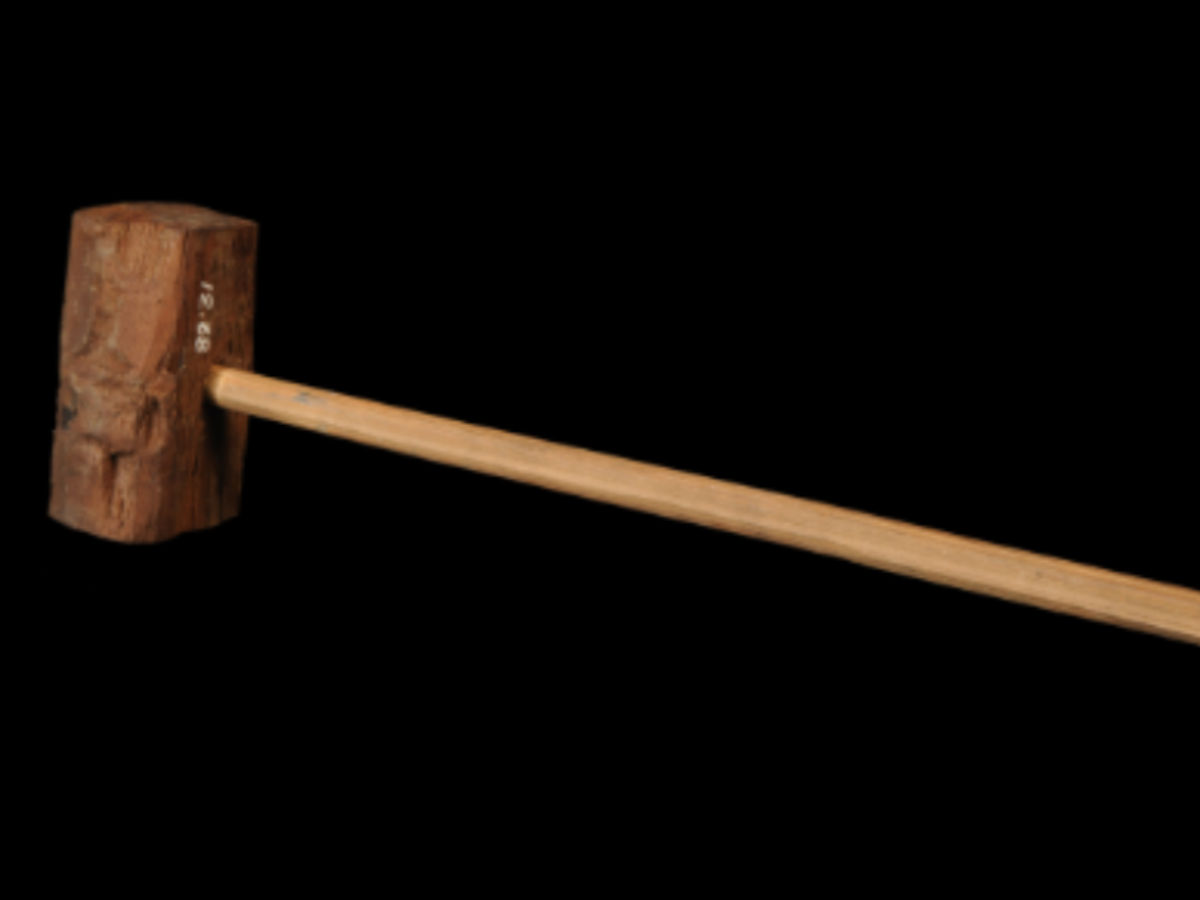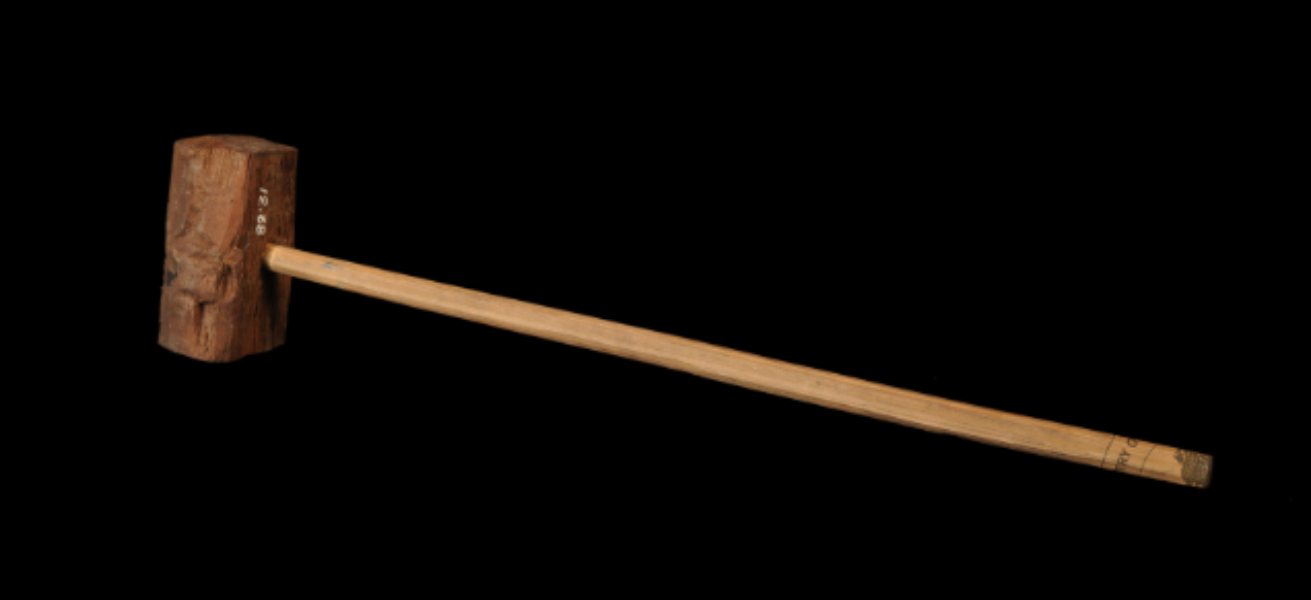State
Tribe Name
Art Type
short description
The Rabha tribe, residing mainly in Assam, Meghalaya and West Bengal, is endowed with profound knowledge concerning the traditional tools of agriculture and its sustainable methods of working. Among their tools, the clod crusher is very important and quite simple but efficient, used for breaking up clods of earth and preparing the land for sowing.
The clod crusher consists of a wooden head and a bamboo handle. Thus it is quite light and quite strong. The wooden head portion was made for smashing clumped, hardened soil to ensure that the field is well prepared for sowing seeds. The bamboo handle gives a sturdy hold for the farmer, freeing him from much exertion, and thus the efficient operation of the tool .
Agriculture is the primary source of livelihood for the Rabha people, and traditional tools like the clod crusher are integral to their farming endeavours. The employment of bamboo and wood as materials shows their implicit awareness about natural resources and their advocacy of an eco-friendly and sustainable lifestyle .
Symbolically, the clod crusher also bears cultural importance for the Rabha. It symbolises self-reliance and the wisdom of traditions handed down through generations. Rabha farmers continue to use much of their traditional handmade farming tools today, despite the availability of modern farm implements, thereby keeping alive their rich heritage as well as their time-honoured farming practices
The clod crusher consists of a wooden head and a bamboo handle. Thus it is quite light and quite strong. The wooden head portion was made for smashing clumped, hardened soil to ensure that the field is well prepared for sowing seeds. The bamboo handle gives a sturdy hold for the farmer, freeing him from much exertion, and thus the efficient operation of the tool .
Agriculture is the primary source of livelihood for the Rabha people, and traditional tools like the clod crusher are integral to their farming endeavours. The employment of bamboo and wood as materials shows their implicit awareness about natural resources and their advocacy of an eco-friendly and sustainable lifestyle .
Symbolically, the clod crusher also bears cultural importance for the Rabha. It symbolises self-reliance and the wisdom of traditions handed down through generations. Rabha farmers continue to use much of their traditional handmade farming tools today, despite the availability of modern farm implements, thereby keeping alive their rich heritage as well as their time-honoured farming practices
Thumbnail

Filter Postion
Right
Filter Background
Off
Theme
Filter Header Image

content
Image

description
The Rabha tribe, residing mainly in Assam, Meghalaya and West Bengal, is endowed with profound knowledge concerning the traditional tools of agriculture and its sustainable methods of working. Among their tools, the clod crusher is very important and quite simple but efficient, used for breaking up clods of earth and preparing the land for sowing.
The clod crusher consists of a wooden head and a bamboo handle. Thus it is quite light and quite strong. The wooden head portion was made for smashing clumped, hardened soil to ensure that the field is well prepared for sowing seeds. The bamboo handle gives a sturdy hold for the farmer, freeing him from much exertion, and thus the efficient operation of the tool .
Agriculture is the primary source of livelihood for the Rabha people, and traditional tools like the clod crusher are integral to their farming endeavours. The employment of bamboo and wood as materials shows their implicit awareness about natural resources and their advocacy of an eco-friendly and sustainable lifestyle .
Symbolically, the clod crusher also bears cultural importance for the Rabha. It symbolises self-reliance and the wisdom of traditions handed down through generations. Rabha farmers continue to use much of their traditional handmade farming tools today, despite the availability of modern farm implements, thereby keeping alive their rich heritage as well as their time-honoured farming practices
The clod crusher consists of a wooden head and a bamboo handle. Thus it is quite light and quite strong. The wooden head portion was made for smashing clumped, hardened soil to ensure that the field is well prepared for sowing seeds. The bamboo handle gives a sturdy hold for the farmer, freeing him from much exertion, and thus the efficient operation of the tool .
Agriculture is the primary source of livelihood for the Rabha people, and traditional tools like the clod crusher are integral to their farming endeavours. The employment of bamboo and wood as materials shows their implicit awareness about natural resources and their advocacy of an eco-friendly and sustainable lifestyle .
Symbolically, the clod crusher also bears cultural importance for the Rabha. It symbolises self-reliance and the wisdom of traditions handed down through generations. Rabha farmers continue to use much of their traditional handmade farming tools today, despite the availability of modern farm implements, thereby keeping alive their rich heritage as well as their time-honoured farming practices
Image Mode
landscape
promoted
Off
Verified
Off
